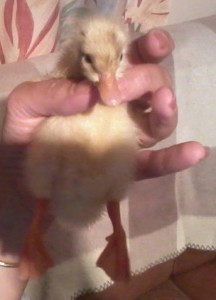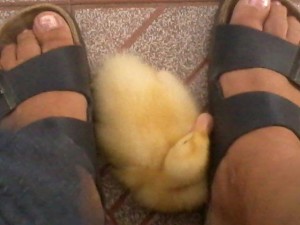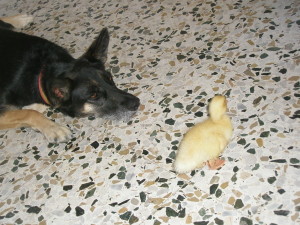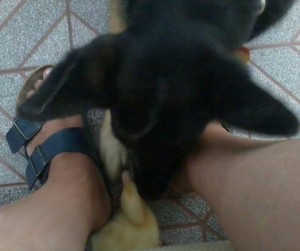I had never really understood why the arrival of a new baby often drew references to ‘the patter of tiny feet.’ Certainly, when my children were born, they showed no sign of walking for quite some time, and when they did finally start, their feet were no longer as tiny as they were at first, and they did not really patter.
I had my suspicions that Dick van Duck would flap about fairly noisily, once he was free to run around the house: he was making quite a good flapping noise as he ran around my décolletage, almost from day one.
I was worried that as soon as Dick was let loose, he would disappear behind or beneath some heavy item of furniture, and we would squash him in any rescue attempt. However, he has grown so rapidly that he is now of a size that makes me confident that Poppy would think twice before swallowing him, and that he would not fit under the sofa any more. In the last couple of days, we have been treated to the sound of his little webbed feet slapping on the tiled floors like a pair of tiny wet fish. The sound is surprisingly loud, and the sheer speed of the slapping makes me break into a grin every time I hear it.
One of the effects of Dick’s conviction that I am his mother is that he wants constantly to be as close as possible. If I move away from him, he scoots as fast as his little legs will carry him, feet flapping nineteen to the dozen and tripping over himself in his haste to get to me. I must admit, I have frequently walked rapidly away from him, in order to watch his comical attempts to reach me as fast as he possibly can. Once he is back with me, he will nestle between my feet if I am standing still, or paddle about, circling me restlessly and peeping. It is a bit like those beepers that lorries have to let you know they are about to reverse, only with Dick, it is just to let me know he is there, and to ask me to pick him up or feed him or both.
Because keeping him in his basket or paddling pool was proving next to impossible, I decided it was time to experiment with letting Dick and Poppy get better acquainted, under close supervision, of course. Poppy is fascinated with Dick, and wants to be Very Close Indeed. She takes every opportunity to lick his face and his bottom, probably in an attempt at mothering him. She is as gentle as her excitement levels will allow, and will sink to the floor and sob at him if we tell her to lie down. She showed similar incredible gentleness when we babysat a tiny kitten once. Friends tell us of their dogs having an instinctive knowledge that baby animals have to be treated with care, so Poppy’s behaviour is impressive, but not unique.
In contrast to Poppy, Dick is a little horror, and tries to pull out her whiskers, jab at her eyes, pull her tail, nip her nose and peck at her various markings. It is hard to know how much to stop Poppy putting him in his place, and I suspect that once he is just a little bigger, we may have to allow her to react and teach him where her limits are.
When I sit at the laptop, Dick will nestle between my feet, often dozing off with his beak resting on my toes. Poppy will crawl on her stomach to get as close as she possibly can, and the two of them will eye each other warily, before starting yet another game of hide and seek around my legs. I look forward to the time when I can leave them to it, rather than being poised to intervene all the time – it gets quite wearing.
Apart from teasing Poppy and following me about, Dick spends most of his time eating, drinking, splashing about in his water bowl, sleeping, pooping and preening.
Internet sources suggest that tiny ducklings are not properly waterproof, so at first I felt obliged to pat Dick dry after each swim. He seemed too tiny to be left wet and possibly vulnerable to catching a chill. Now he is ten days old, I have become more blasé, and let him sort himself out.
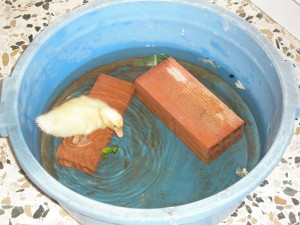
Dick is not convinced about swimming, but likes to perch on a brick and catch floating bits of lettuce and mint
Generally, he does a good job, especially considering he has never had a duck mother to teach him how it should be done. His crop is almost permanently crammed full, and tends to pull him over forwards. His feet are too big for his body, and he often treads on his own toes and tips himself over. His sense of balance leaves a great deal to be desired, and watching him trying to adjust is endlessly amusing. The sinews in his tiny legs flex, and his ankles wobble as he tries to organise his weight properly. If he is really ambitious and tries to preen under his tummy, he quite often tumbles into an untidy somersault.
I am told that Dick will be fully grown by the time he is about ten weeks old, and we shall be able to tell whether he is a duck or a drake. There is a good chance that he will be a handsome white duck by then, and will have grown out of some of the endearing behaviours he is charming us all with now.
Between now and then, we shall have to attempt to house train him and find out just how bright he is and what we can expect him to learn. I suspect both Poppy and I will grow a few grey hairs in the process, but it should be a lot of fun. Who knows, this time next year we may be taking Dick and Poppy out for walks together. Dick can teach Poppy to swim, and she can teach him to fetch a stick, while the locals look on in amazement at the mad extranjeros and their menagerie.


